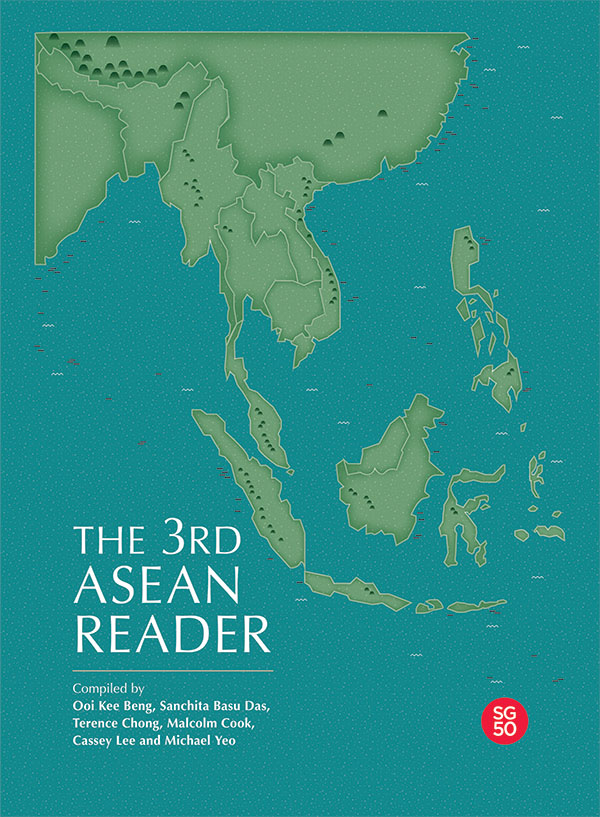Book contents
- Frontmatter
- Contents
- Preface
- Forewords to the First and Second ASEAN Reader: ASEAN: Conception and Evolution
- Forewords to the First and Second ASEAN Reader: ASEAN: The Way Ahead
- Forewords to the First and Second ASEAN Reader: New Challenges for ASEAN
- SECTION I ASEAN: THE LONG VIEW
- SECTION II COUNTRY ANALYSES
- SECTION III COMPARATIVE ANALYSES OF THE REGION
- Southeast Asian Societies
- The Southeast Asian Economy
- Southeast Asian Politics
- SECTION IV INTERNATIONAL DEVELOPMENTS
- SECTION V INSTITUTIONS OF ASEAN
- SECTION VI ASSESSING ASEAN'S INTERNAL POLICIES
- ASEAN Political Security Community
- ASEAN Economic Community
- ASEAN Socio-Cultural Community
- 52 An ASEAN Community for All: Exploring the Scope for Civil Society Engagement
- 53 Civil Society and the ASEAN Community
- 54 The Evolving ASEAN Human Rights System: The ASEAN Human Rights Declaration of 2012
- 55 Divided or Together? Southeast Asia in 2012
- 56 The ASEAN Socio-Cultural Community
- 57 ASEAN Socio-Cultural Community: An Assessment of its Institutional Prospects
- 58 Executive Summary of the Mid-Term Review of the ASEAN Socio-Cultural Community Blueprint (2009—2015)
- SECTION VII ASSESSING ASEAN'S EXTERNAL INITIATIVES
- ASEAN Processes
- ASEAN's Major Power Relations
- SECTION VIII SOUTHEAST ASIA: PERIPHERAL NO MORE
- Bibliography
- The Contributors
- The Compilers
53 - Civil Society and the ASEAN Community
from ASEAN Socio-Cultural Community
Published online by Cambridge University Press: 22 June 2017
- Frontmatter
- Contents
- Preface
- Forewords to the First and Second ASEAN Reader: ASEAN: Conception and Evolution
- Forewords to the First and Second ASEAN Reader: ASEAN: The Way Ahead
- Forewords to the First and Second ASEAN Reader: New Challenges for ASEAN
- SECTION I ASEAN: THE LONG VIEW
- SECTION II COUNTRY ANALYSES
- SECTION III COMPARATIVE ANALYSES OF THE REGION
- Southeast Asian Societies
- The Southeast Asian Economy
- Southeast Asian Politics
- SECTION IV INTERNATIONAL DEVELOPMENTS
- SECTION V INSTITUTIONS OF ASEAN
- SECTION VI ASSESSING ASEAN'S INTERNAL POLICIES
- ASEAN Political Security Community
- ASEAN Economic Community
- ASEAN Socio-Cultural Community
- 52 An ASEAN Community for All: Exploring the Scope for Civil Society Engagement
- 53 Civil Society and the ASEAN Community
- 54 The Evolving ASEAN Human Rights System: The ASEAN Human Rights Declaration of 2012
- 55 Divided or Together? Southeast Asia in 2012
- 56 The ASEAN Socio-Cultural Community
- 57 ASEAN Socio-Cultural Community: An Assessment of its Institutional Prospects
- 58 Executive Summary of the Mid-Term Review of the ASEAN Socio-Cultural Community Blueprint (2009—2015)
- SECTION VII ASSESSING ASEAN'S EXTERNAL INITIATIVES
- ASEAN Processes
- ASEAN's Major Power Relations
- SECTION VIII SOUTHEAST ASIA: PERIPHERAL NO MORE
- Bibliography
- The Contributors
- The Compilers
Summary
INTRODUCTION
With the deadline to achieve an Association of Southeast Asian Nations (ASEAN) Community by 2015 drawing near, there has been an increased urgency to ensure that ASEAN leaders’ commitment to “promote ASEAN peoples to participate in and benefit fully from the process of ASEAN integration and community building”1 does not go unfulfilled. Unfortunately, there are still gaps in our knowledge that need to be filled if policymakers are to make better-informed decisions about how to improve the quality and impact of dialogue between ASEAN and civil society organisations (CSO).
This chapter's objective is to identify the opportunities and challenges for ASEAN-CSO engagement. This will be done in the context of existing and developing ASEAN processes (such as the ASEAN Socio-Cultural Community Roadmap).
ASEAN-CSO ENGAGEMENT TO DATE
ASEAN engagement with CSOs is currently at a crossroads as the work by member states laid out in the ASEAN Socio-Cultural Community Roadmap accelerates. CSOs have also taken strides in developing their own discursive processes, with the three traditional tracks of CSO discussions, namely, the ASEAN-ISIS network's ASEAN People's Assembly (APA), the ASEAN Civil Society Conference (ACSC), and the ASEAN People's Forum (APF), now amalgamated into what is currently known as the ACSC/APF.
Unfortunately, recent events between the ASEAN Secretariat (ASEC) and CSOs have shown that there is still work to be done to improve the relationship between these two actors. At an ASEAN-CSO interface session in February 2009 following the ACSC/APF, one government official protested the inclusion of a particular CSO representative. At the next ACSC/APF in October of the same year, five out of 10 civil society representatives (selected by their peers) were rejected from another official interface session between ASEAN and CSO representatives and their ASEAN heads of government. The actions of ASEAN officials were seen as undermining the democratic efforts of civil society to speak for their constituents.
The difficulties of ASEAN-CSO engage-ment since 2009 could be considered a blessing in disguise, as it spurred both CSOs and ASEC into recognising the potentially damaging consequences if the broken relationship was left to fester, thus galvanising CSOs and ASEC into taking steps to mend and enhance their relationship.
As such, we can observe an openness in ASEAN to improve the existing engagement tracks, and a heightened awareness from the CSOs that they play no small role in the reshaping of their sphere of influence on ASEAN-level policies.
- Type
- Chapter
- Information
- The 3rd ASEAN Reader , pp. 278 - 283Publisher: ISEAS–Yusof Ishak InstitutePrint publication year: 2015



